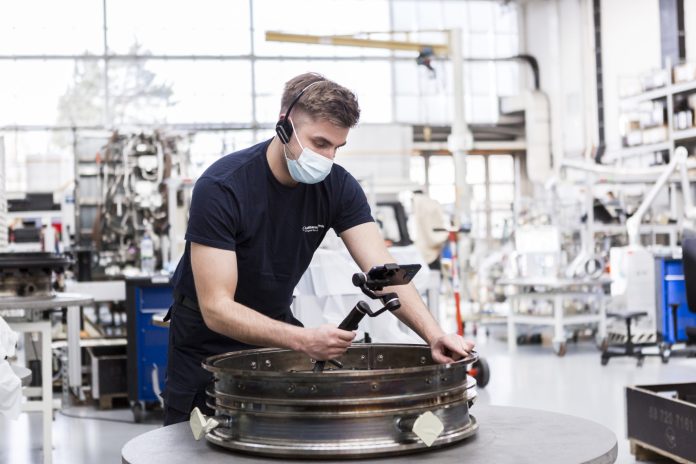Lufthansa Technik, which has arguably set down the definitive private 5G deployment in the Industry 40 sector, has extended its private 5G network in Hamburg, Germany, to a second aircraft engine ‘overhaul workshop’, it has announced. The firm is now running remote parts inspection and ‘boroscopy’ at both sites. It has also ruled out 5G radio interference with flight operations, following some controversy, notably in the US.
Lufthansa Technik, the airline services division of the Lufthansa Group, introduced a private 5G network at a workshop for aircraft engines in Hamburg in 2020. The installation, from Nokia, enabled the firm to stream high-resolution video of engine inspections. The use case gained critical importance as the Covid-19 pandemic caused travel restrictions, and effectively stopped customers from joining physical inspections at the Hamburg site.
Its so-called ‘virtual table inspection’ (VTI) solution, running over 5G, rapidly moved from a test project to a business-critical infrastructure. The VTI setup was integrated into its AVIATAR digital operations suite last year, specifically for work on CFM56 and V2500 engines at the Hamburg workshop. The 5G network and VTI service have now been extended to a second engine shop where LEAP engines, a product of 50/50 CFM International joint-venture between GE and Safran Aircraft Engines, as well as CF6-80 engines are overhauled.
A statement said: “Based on the excellent experience in the engine services business unit, the 5G network there has now been extended to a second overhaul workshop… Operators can now also interact remotely with the mechanics on-site in Hamburg, saving time and money while making important repair decisions for their engines. As such decisions often involve six-digit figures, the high video resolution and the stable, reliable and confidential connection to the customer at all times provided by 5G are essential for this offering.”
Lufthansa Technik said the number of services using its 5G network, privately licensed on a 10-year deal from German regulator BNetzA in the 3.7-3.8 GHz band, has also increased. Both workshops are now offering borescopy examinations, it said, to relay high-res video streams to customers of “even the most remote cavities and other hard-to-reach areas of their engines, from the other end of the world”. It added: “Even the smallest scratch marks of just 0.3 millimetres in length [can be] reliably identified [on video over 5G].”
It said of the BNetzA licence: “This secures the independent application of this future technology at the Hamburg headquarters for the long term. This also means that nothing stands in the way of further expansion of the campus network there. Due to the promising properties of 5G technology, which Lufthansa Technik is largely free to configure for its own purposes, the company is already considering further possible applications in the advancing digitalization of the maintenance, repair and overhaul (MRO) business.”
It suggested parts-tracking (“localization of components”) as a future use case for its industrial 5G setup – “significantly simplified with upcoming releases of the 5G standard”, it noted.
The question about radio interference has also been dealt with, it claimed. Its base in Hamburg is adjacent to the city’s international airport, putting additional stress on the need to prove the operational security of its radio networks, it noted. But Lufthansa Technik is not dismissive of the US concerns; only that the situation in Germany is clear. “Possible interference of 5G technology with flight operations is ruled out… [in] Hamburg… because of the frequency bands used in Europe,” it commented.
It explained: “Compared with the [3.7-3.98 GHz- public 5G band in the US, the safety margin [with 3.7-3.8 GHz spectrum in Germany] to the frequency band used by radar altimeters on commercial aircraft (4.2-4.4 GHz) is twice as large here. Moreover, Lufthansa Technik has so far employed 5G… exclusively inside industrial buildings, which, with their high steel and concrete content, massively shield all wireless networks from the outside world.”
Lufthansa Technik has had BNetzA document the clearance of its 5G network with a site certificate – although, it said, this was a cautionary measure and not a mandatory one. It has also engaged with test company Rohde & Schwarz to detect any 5G signals outside the areas designated for the campus network, with the network scanner used being significantly more sensitive than a cell phone and registering even the weakest signals, it explained.
But Lufthansa Technik remains reluctant to make 5G a hero tech for industry. Claudius Noack, IT consultant at Lufthansa Industry Solutions, the sister SI-company that has been engaged on the 5G install, suggested it is not a cure-all, and that tech should always, as a rule, be filtered by use-case. He commented: “It is advisable not to commit to a standard from the outset, but to evaluate specific use cases in an open-ended manner with regard to technology and manufacturers and then to address them with the best technology available at the time.
Michael Kirstein, vice president for engine services operations at Lufthansa Technik, said: “In the pandemic situation, virtual parts inspections and digital borescopies have clearly gained acceptance in our company. The 5G-based video streams have helped us enormously. In the past, such inspections often had to be planned several weeks in advance. Now we can schedule inspections at very short notice, which our customers really appreciate.”
Stephan Drewes, head of information management at Lufthansa Technik, said: “We are very pleased with the opportunities 5G offers us and with the successful implementation. Of course, we will only roll out this technology further and configure it to fit the specific requirements on-site where 5G demonstrably brings a technological or economic advantage over other wired or radio-based technologies, such as Wi-Fi 6, for the particular use case. In this regard, we place particular trust in the competent partnership with Lufthansa Industry Solutions.”

